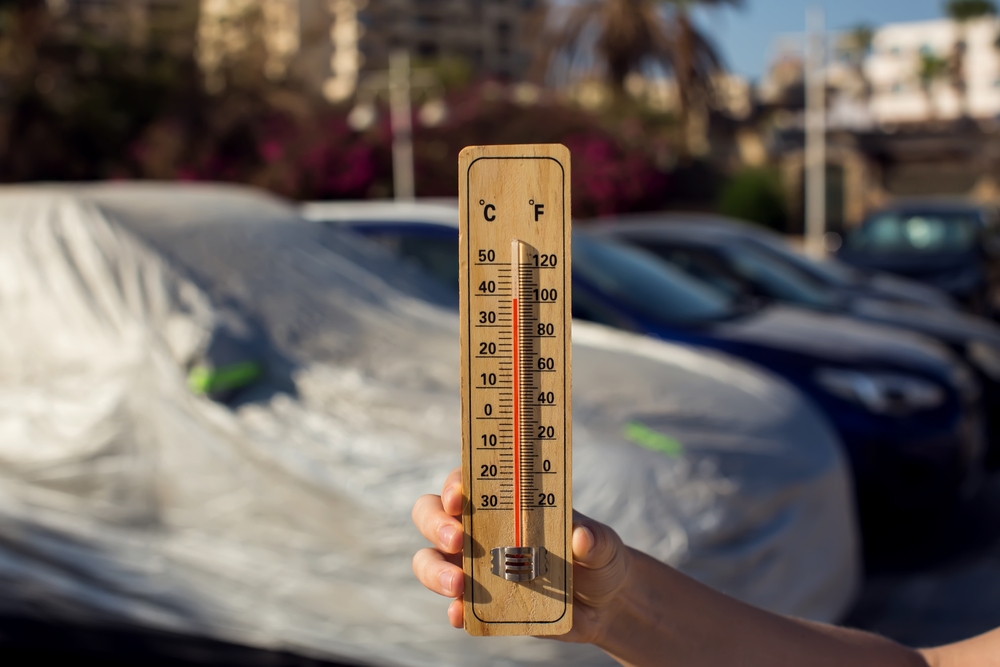Summer is a time for road trips, long drives, and spontaneous weekend getaways—but before you hit the road, it’s important to ensure your car is ready to handle the heat. High temperatures can strain your vehicle in ways you might not expect, from engine performance to tire safety.
At Kunes Auto Group, we want you and your vehicle to stay safe and comfortable all season long. That’s why we’ve put together this detailed, step-by-step guide to help you prepare your car for hot weather like a pro.
Step 1: Give Your Cooling System a Checkup
Your engine generates a lot of heat even in mild weather. When the summer sun turns up the temperature, your cooling system becomes your first line of defense.
What to Do:
- Check your coolant levels: Pop the hood and make sure the coolant reservoir is filled to the correct level. Use a 50/50 mix of coolant and distilled water for optimal performance.
- Inspect hoses and belts: Look for signs of wear such as cracks, bulges, or leaks. These parts expand in hot weather, making them more susceptible to failure.
- Look at the radiator: Make sure it's clean and free of obstructions like bugs, dirt, or leaves, which can block airflow and reduce cooling efficiency.
Service Tip: If it’s been a while since your last coolant flush, schedule one with Kunes Auto Group to prevent overheating and costly engine damage.
Step 2: Battery Health Matters
Hot weather accelerates chemical reactions in your battery, which might sound like a good thing—but it actually leads to faster battery degradation.
What to Do:
- Test the battery: We can do this for free at Kunes Auto Group! This helps determine how much life your battery has left.
- Check terminals for corrosion: White, chalky buildup around the terminals can hinder performance. Carefully clean it with a wire brush.
- Ensure it's tightly mounted: Loose connections can lead to vibration damage, especially on bumpy summer roads.
Did You Know? Batteries last an average of 3-5 years. If yours is nearing that mark, summer is the perfect time to replace it.
Step 3: Make Sure Your A/C is in Peak Condition
There’s nothing worse than climbing into a hot car and discovering the air conditioning isn’t working. Your A/C system not only keeps you comfortable—it also plays a role in defogging your windows and filtering cabin air.
What to Do:
- Run a quick test: Let your car run with the A/C on full blast. Is it cooling the cabin quickly and evenly?
- Check cabin air filters: Dirty filters reduce airflow and can spread allergens. A fresh filter makes a big difference.
- Listen and smell: Strange noises or musty odors coming from the vents? That could mean it’s time for a professional inspection or a refrigerant recharge.
Pro Service: Kunes technicians can recharge your A/C system, inspect for leaks, and replace worn components to ensure you stay cool on the road.
Step 4: Tires—More Than Just Rubber on the Road
Heat affects tire pressure and tread integrity, both of which are critical for safety and performance.
What to Do:
- Check pressure weekly: Use a tire pressure gauge when tires are “cold” (before driving). Adjust to the recommended PSI found in your owner’s manual or door sticker.
- Inspect tread wear: Use the penny test—insert a penny into the tread with Lincoln’s head down. If you can see his entire head, it's time for new tires.
- Look for sidewall damage: Cracks, bubbles, or embedded debris are all signs it’s time for attention.
Don’t Forget: Your spare tire needs love too! Make sure it's inflated and in good condition in case of an emergency.
Step 5: Monitor All Vehicle Fluids
Hot weather puts all your car’s systems under more stress, and your fluids are no exception. Each one plays a vital role in keeping your vehicle running smoothly.
What to Do:
- Oil: Check the level and condition. Summer is a great time to switch to a high-performance or synthetic oil if you haven’t already.
- Transmission fluid: If it’s dark or smells burnt, it may need changing.
- Brake fluid: A soft brake pedal could mean low fluid or a need for a flush.
Washer fluid: Summer roads can be dusty and full of bugs—keep your windshield clean and clear.
Step 6: Protect Your Vehicle’s Exterior and Interior
Summer heat and UV rays can fade paint, crack dashboards, and damage leather or cloth upholstery.
What to Do:
- Wash and wax regularly: Wax acts as a sunscreen for your paint, protecting it from fading and oxidation.
- Use sunshades: These help block UV rays and reduce cabin temperature.
- Tint your windows (where legal): This reduces glare and protects your car’s interior.
- Condition your seats and dash: Use leather conditioner or vinyl protectant to prevent cracking and fading.
Bonus Tip: Consider a ceramic coating for long-term protection—it adds a high-gloss finish and helps repel water, dirt, and heat.
Final Thoughts
Preparing your car for hot weather doesn’t just enhance comfort—it prevents breakdowns and helps you avoid costly repairs. A little proactive maintenance goes a long way in ensuring a smooth and safe summer driving experience.
At Kunes Auto Group, we’re here to help with expert inspections, certified service, and advice you can trust. Whether you need a quick tune-up or a full summer readiness check, our team is ready to keep your vehicle in top shape.


